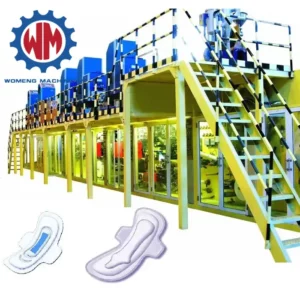Operating wholesale sanitary pad machines presents several challenges, despite their advanced capabilities.
Some common challenges faced in their operation include:
- Complexity of Setup: Wholesale sanitary pad machines can be complex to set up and calibrate, requiring skilled technicians with specialized knowledge. Adjusting machine settings, configuring production parameters, and fine-tuning equipment for different pad designs, sizes, and absorbency levels may pose challenges, especially for operators with limited experience.
- Maintenance Requirements: Maintaining optimal performance and reliability of wholesale sanitary pad machines requires regular maintenance and servicing. However, scheduling downtime for maintenance tasks while minimizing production disruptions can be challenging. Balancing preventive maintenance activities, such as cleaning, lubrication, and parts replacement, with production demands is essential to avoid unexpected breakdowns and downtime events.
- Material Handling Issues: Wholesale sanitary pad machines rely on efficient material handling systems to feed raw materials, such as pulp, SAP (Super Absorbent Polymer), and non-woven fabrics, into the production process. Material handling challenges, such as jams, misfeeds, and material inconsistencies, can disrupt production flow and impact overall equipment efficiency. Proper alignment, tension control, and monitoring of material handling systems are essential to mitigate these issues.
- Quality Control Concerns: Ensuring consistent product quality and meeting regulatory standards is a critical challenge in the operation of wholesale sanitary pad machines. Variations in raw materials, production processes, and environmental conditions can affect product performance, absorbency, and comfort. Implementing robust quality control measures, such as real-time inspection systems, process monitoring, and product testing, is necessary to detect defects, deviations, and non-conformities early in the production process.
- Production Efficiency Optimization: Maximizing production efficiency while minimizing waste and downtime is an ongoing challenge for operators of wholesale sanitary pad machines. sanitary pad machine manufacturers Balancing production speed, equipment utilization, and resource allocation to meet demand fluctuations and market requirements requires careful planning and continuous improvement initiatives. Optimizing production workflows, equipment layout, and scheduling strategies can help enhance efficiency and productivity.
- Operator Training and Skills: Operating wholesale sanitary pad machines effectively requires well-trained and skilled operators who understand the equipment, production processes, and quality requirements. Providing comprehensive training programs and ongoing skill development opportunities for operators is essential to ensure safe, efficient, and reliable machine operation. Adequate training reduces the risk of errors, accidents, and production delays caused by operator-related issues.
- Market Dynamics and Competition: External factors, such as changing market dynamics, competitive pressures, and consumer preferences, can pose challenges to wholesale sanitary pad machine operators. Adapting to market trends, introducing new product innovations, and maintaining competitiveness require agility, market intelligence, and strategic decision-making. Continuous market analysis and customer feedback mechanisms help identify opportunities and challenges to stay ahead of the competition.
Addressing these challenges requires a holistic approach that combines technical expertise, operational excellence, and strategic planning. By proactively managing these challenges, operators of wholesale sanitary pad machines can optimize production efficiency, maintain product quality, and sustainably grow their businesses in the hygiene product manufacturing industry.
